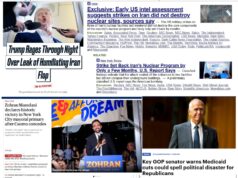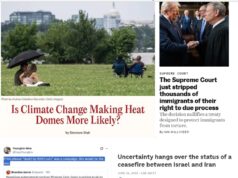Preface: I believe strongly that even apparently implacable “realities” can be transformed by creativity at the level of the spirit. Which means that when one is in a “bad situation,” the challenge is to look for ways in which the unfolding of the situation can be re-routed onto a more positive path.*
The presidency of Donald Trump is surely such a situation, calling for some transformative move, at the level of the spirit, that can turn our national crisis to good ends.
***************
For almost two years now, Donald Trump has been at the center of American attention, dominating our national conversation to a degree that, to the best of my knowledge, is beyond the attention given to anyone in our history.
Given that Donald Trump is (by far, I would assert) the worst human being ever to occupy the presidency, having such a grotesque display be the primary focus of attention for the American people, over an extended period of time, would seem to pose a threat to our national spirit. Even apart from all the damage that Trump is able to inflict on the nation by virtue of his almost invariably pernicious decisions, he also threatens to poison American hearts and minds simply by virtue of the effect of our continually peering into such ugliness.
So I have been wondering whether there is a way – simply at the level of the impact of the ugliness – to transmute this ordeal of so toxic a display at center stage into something positive for the nation.
Here’s what comes to me as a possible answer:
Use all the ways that Trump tramples on American norms and ideals to highlight and promote those norms and ideals. Awaken the American people to those components of our heritage that have done important good, explaining how they have worked over the generations to foster the blessings that Americans have enjoyed.
Two points: 1) how this might meet the present American need; and 2) why this might work.
1) The American public of today may be more ignorant than past generations of basic knowledge about “civics,” i.e. those lessons regarding the system our founders bequeathed us. (Over recent generations, for example, American public schools generally have apparently withdrawn from the task of teaching such lessons.)
When a president attacks the independent judiciary (“so-called judge”), how many Americans understand the value of the norm he has attacked? A powerful message that uses such attacks to hold up that great American ideal could transform that damaging presidential conduct into an inspiring educational lesson on how the American system is designed to protect our liberties through the rule of law.
When a president attacks the free press (“enemy of the people”), how many Americans understand the vital role – acknowledged in the First Amendment — that the American system recognizes that the press must play if tyranny is to be prevented? A powerful message that uses such attacks to explain the vision of an informed public in a free marketplace of ideas, as a safeguard of our protection against unchecked power, could transform the danger from such an assault into a stronger public commitment to protect and defend that essential part of the U.S. Constitution.
When a president seeks to coerce the FBI into being loyal to him and not to our being “a nation of laws, not of men,” there is likewise the opportunity to educate the American people on the value of the ways our forebears have created political institutions and culture to safeguard our ability to hold power accountable.
And so on, with all the other components of our system of checks and balances, and norms in our political culture, on which Donald Trump so frequently tramples.
The emphasis here is not so much on the critique of Trump as on a picture of our ideals that educates and inspires people to protect them.
2) I was born in the immediate aftermath of World War II. This was an era in which people had been compelled to look with horror, over the course of years, on some of the ugliest conduct the civilized world had seen – ever, or at least for centuries. The brutality of the Nazis was an especially terrible burden on the consciousness of the era.
Yet an important component of the impact of that experience was the transmutation of that terrible example into a re-dedication of the American and British peoples to all that they were fighting to protect. In FDR’s and Churchill’s speeches, the contrasts were laid out starkly to reaffirm what it is that we – the not-the-Nazis – stood for.**
In the movies made during the war, and for a generation afterward, a consistent motif was the contrast between the decency of our side and the cruel practices of the enemys. Frequently, the message was along the lines of: “The Gestapo tortures, but we Americans do not.” The contrast, I would wager, served to actually make our society more decent.
So there would seem to be a precedent for utilizing the ugliness of an opponent as an occasion to fortify our commitment to the values that ugly opponent is attacking.
That is the course I believe that we who oppose Trump should now take:
Elevate the most eloquent of available prominent voices to elevate our best values and to fortify them by educating and inspiring the American people on the importance of our ideals and norms to protecting the liberty and decency of the American nation.
________________________________________
* An example of this transformative power of the spirit is the effect of Winston Churchill’s rhetoric on a frightened nation at a very dark hour. After one of his speeches, an English civilian wrote: “I remember being very frightened indeed when France collapsed because I thought it was going to be us next. Really frightened. Until I heard the speech that Churchill made on the radio about fighting on the beaches. I suddenly wasn’t frightened anymore. It was quite amazing.”
(Lincoln’s speech at Gettysburg also, reportedly, had a profound effect on the spirit of the Union.)
** Churchill on what the war was about” “We are fighting to save the whole world from the pestilence of…tyranny and in defence of all that is most sacred to man…It is a war, viewed in its inherent quality, to establish, on impregnable rocks, the rights of the individual, and it is a war to establish and revive the stature of man.”


 Sign up for the Blue Virginia breaking news newsletter
Sign up for the Blue Virginia breaking news newsletter











